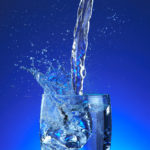By David Blyweiss, M.D.
Every January, people set out their list of New Year’s resolutions.
Topping that list?
Taking off those extra pounds. And, the weight loss and fitness industry takes full advantage of the desire to be thin and fit with special offers promising miracles.
Now I really don’t want to burst your bubble, but there isn’t a magic pill or exercise that will help you shed the pounds overnight. And severely slashing calories or cutting out whole food groups is just plain unhealthy.
The truth is, you can’t hurry lasting weight loss. And that’s why I consider patience a key tool in losing weight. Remember, it took time to add the extra 10, 20 or 30 pounds. Yet, most of us want to lose it all in a matter of weeks or months. It simply doesn’t make sense. What does make sense is to approach weight loss not as a temporary diet or quick fix, but instead as a healthy lifestyle that will be maintained for the rest of your life.
MD Exposes the Hidden Danger to Your Eyes

When your eyesight starts to fail, it's a real problem. Suddenly you can't go to the grocery store... you can't get to the doctor if you have an emergency... you can't meet your friends for dinner…
Your "regular" doctor doesn't have time to keep up with the latest research. And the same goes for eye doctors. They go to school to learn how to fit you for glasses and contacts, but have no way of preventing the damage and loss of eyesight that threatens your freedom and independence.
Let me show you something that explains a LOT about how your eyes work.
In my FREE Special Report, I'll show you a HUGE, untapped resource for your eyes that safely and naturally restores clear, effortless eyesight.
Click here to get started...
Ideally, you should strive to lose one to two pounds per week. While you won’t drop that five or ten pounds quickly, the slow and steady approach will give you a better chance of keeping it off. A safe and effective goal is to lose one pound a week. To accomplish this, you must either eat 500 less calories or burn 500 calories per day.
One easy way to cut calories is to swap the soda pop for water or unsweetened green tea. Reducing your portion size (see Wednesday’s bulletin) can also eliminate hundreds of calories throughout the day. It’s also smart to pack in more protein. The high-protein, low-carb approach may help keep you from losing muscle along with fat, according to a study published in The American Journal of Clinical Nutrition.
The second step to permanent weight loss is to make movement part of your life. Now, that doesn’t mean you have to spend hours at the gym—although working out several days a week will help you get in shape.
The goal is to get off the couch and move more than you do now. Take a walk, take the stairs, go dancing or try a yoga class. Start slowly and work your way up to an hour of movement at least five days per week. Not only will this tone your muscles and burn calories, it will also boost your energy levels.
Third on the list is motivation. When it comes to weight loss, motivation is critical. Most people know the feeling of hope and excitement when they begin a new weight loss or fitness plan. They envision themselves slimmer, fitter and healthier.
But this motivation can wane soon after a diet begins. Staying motivated by teaming up with a friend or using an online weight loss community can keep you excited about your progress.
Are You Suffering From...
- Love handles and a pot belly
- Romance that isn't what it used to
- Forgetfulness and inattention
- Low (or no) strength and endurance
- A sex drive that's shifted into neutral...or worse
If so...you may have Mature Male Burnout. Click here to discover more about this unique condition and what you can do about it.
Just don’t confuse motivation with willpower. Many unsuccessful dieters blame a lack of willpower for their weight loss failures. This is unfortunate, because willpower, or lack of it, is not the culprit.
You see, in weight loss, the term willpower is connected to resistance. It implies that one must have the “strength to resist temptation.” But motivation is actually the desire to achieve your goals and it’s a much stronger human trait than willpower.
The fourth, and final, step to successful weight loss is the strategic use of supplements. No, I’m not talking about an appetite suppressant. I’m talking about nutrients that work with your body to support healthy weight loss. There are several specific supplements that I recommend to my patients to help them take off the weight:
7-Keto. This natural metabolite is produced in your adrenal glands and enhances your resting metabolic rate. Clinical studies show that 7-Keto works naturally with your body to enhance the activity of three key fat burning (thermogenic) enzymes. 7-Keto, in conjunction with a diet and movement, has been shown to accelerate weight and fat loss by 200 percent over the same period of time compared to a similar program with a placebo. Researchers have also discovered that 7-Keto improves immunity and improves memory. And it’s safe. In fact, 7-Keto does not have any known side effects. For best results, I recommend taking 100 mg. of 7-Keto twice a day.
Aceytl-L-Carnitine. This amino acid moves fat into the mitochondria, the little power centers of cells, so that the fat can be burned for energy. Quite simply, without optimal amounts of carnitine, there is not optimal fat burning. The most effective dose is 1,000 mg. daily. For best absorption, carnitine should be taken on an empty stomach—half an hour before a meal, right before a workout or a couple of hours after eating.
Conjugated Linoleic Acid (CLA). A number of studies in animals and humans indicate that CLA supplementation decreases body fat and increases lean muscle mass. This effect is most pronounced in people who exercise regularly, which makes CLA an ideal aid for maintaining desirable weight after those extra pounds have been lost. Studies show that taking 3,400 mg. of CLA, divided into two to three doses daily, can help give body fat the boot.
CoQ10. This vitamin-like compound acts like an antioxidant protecting cells against free radical damage. It exists in every cell of your body and you could not survive without it. CoQ10 is essential in the body’s production of adenosine triphosphate (ATP), which produces energy within the cells. No other substance will substitute for CoQ10. Without it there is no spark and therefore no production of energy for the cell. And without energy there is no life! Yet, as we age, it becomes more and more difficult for the body to produce enough CoQ10. Supplementing with 100 mg. of CoQ10 each day can ensure that your organs—especially the heart—have the necessary spark of life critical to activating the body’s stores of energy. If you want to get your body moving, ensuring proper tissue levels of CoQ10 is a good place to start.
Green Tea. Not only does green tea offer excellent antioxidant protection, it also appears to block starches. One recent study confirms that tea catechins—potent antioxidants—are effective in suppressing increases of glucose and insulin concentrations in the blood. Since blood sugar tends to increase with age, this effect is an extremely important anti-aging benefit. Another study indicates that one of the specific catechins, epigallocatechin gallate (EGCG), lowers appetite, body weight, blood sugar and insulin levels. All of these actions contribute to healthy weight loss. To get the full benefit green tea has to offer, drink at least four cups of green tea daily or take a standardized green tea supplement providing 97 percent polyphenol content.
Taken together, these four steps will help you shed the weight without deprivation. By adopting these lifestyle changes instead of going “on a diet,” you’ll be pleasantly surprised to find that those pants are looser, you’re feeling healthier and you are well on your way to a slimmer, more vibrant life!
References:
Celik S. Effects of intraperitoneally administered ubiquinone on the level of total lipid and fatty acids in rat liver. Cell and Biochemical Function. 2006;24:561-564.
Kalman DS. A Randomized, Double-Blind, Placebo Controlled Study of 3-Acetyl-7-Oxo-Dehydroepiandrosterone in Healthy Overweight Adults. Current Therapeutic Research. 2000; 61:435-442.
Krieger JW. Effects of variation in protein and carbohydrate intake on body mass and composition during energy restriction: a meta-regression 1. American Journal of Clinical Nutrition. 2006;83:260-274.
Wolfram S. Anti-obesity effects of green tea: from bedside to bench. Molecular Nutrition & Food Research. 2006;50:176-187






